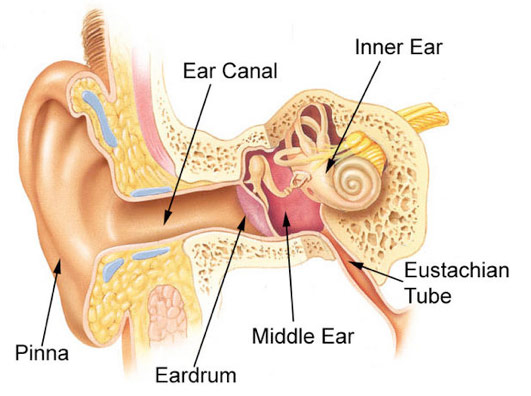I experience barotitis only during SOME (not all) descents. During takeoffs, my ears feel different, but I feel no pain.
Is the cause pilot's skills, rate of descent, or aviational?
I experience barotitis only during SOME (not all) descents. During takeoffs, my ears feel different, but I feel no pain.
Is the cause pilot's skills, rate of descent, or aviational?
As a plane climbs out, the cabin pressure lowers so that it equals the same pressure as being at about 5,000 feet, the altitude of Denver. What happens inside your ear is that the pressure in the middle ear reduces to match the 5,000 foot cabin pressure, and you might sometime feel your ears "pop," just like going up in an elevator in a tall building.
When the plane descends, the pressure in your middle ear will still be at 5,000 feet, but the pressure in the cabin will go down to sea level (0 feet), and you will feel this pressure on your eardrum, which can cause a lot of discomfort until the pressure equalizes.
The pressure equalizes as air enters the eustachian tubes, which connect your middle ear to your nose and throat. The tube, however, is very narrow and can be blocked by inflammation or mucus due to a cold or other illness, and you won't be able to equalize the pressure. Flying with a cold can be very painful during descent.
The amount of discomfort each passenger experiences is going to vary widely, even from flight-to-flight. For example, if the cabin altitude is 5,000ft and the destination is Denver, then the cabin will not have to further pressurize. Some other factors are individual physiology (some people will have bigger eustachian tubes than others), illness, ethnicity/gender/gift-of-gab (some are more prone to talking than others, and talking can relieve the pressure), etc.
As a pilot, there are two things you can do:
buy a plane with a lower cabin altitude. I recommend the Gulfstream 650, which has a cabin pressure of 2,765ft at an altitude of 41,000MSL
reduce the rates of your descents, which will give your ears a chance to equalize. ATC, however, expects you to descend at between 500 and 1,500FPM, unless you are given "AT PILOTS DISCRETION."
There are a few different ways to equalize the pressure. The most effective is the valsava maneuver, which is how some scuba divers equalize the pressure as they descend into the water. Alternatively, yawning, chewing gum, sucking on hard candy, or hyperextending your jaw may help. Little children are particularly susceptible to discomfort, and parents will give them gum or candy at the beginning of the descent.

Ear discomfort during flight happens when the air pressure in the cabin changes faster than the air pressure in your tympanic cavity can follow it; the resulting pressure difference across the eardrum can hurt.
Since the tympanic cavity "remembers" an earlier pressure, it can be higher than ambient during departure, and lower than ambient during descent. This creates different sensations; it seems to be common to find the descent situation more unpleasant.
While rates of ascent and descent are not absolutely equal from flight to flight, the major variable is how fast the pressure in the tympanic cavity can be equalized through the eustachian tubes. This varies from person to person, as well as from day to day for the same person.
The eustachian tube is usually closed but opens from time to time to allow the pressure in the ear to equalize. The tube often opens briefly as a side effect of jaw movement, swallowing and the like. If there's more mucus in your system than usual -- for example, if you have the beginnings of a cold that is otherwise too mild to annoy you -- effective openings of the tube can be less frequent (and the risk of discomfort during flight therefore higher).
Even if your state of health is 100% the same between two descents, random variations in how much you talk, chew, swallow saliva, and so forth, can make the difference between discomfort in one descent and none in another.
(Personally I've found that yawning is the most effective way for me to equalize pressure during descent, and swallowing which is otherwise widely recommended does little for me -- but not everybody works the same way).